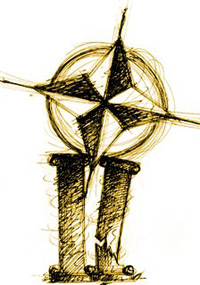
BRUSSELS - A top NATO general said Tuesday that aspects of the alliance were "obsolete," echoing President-elect Donald Trump's language and saying that the Western military alliance needs to adapt for a changing world.
The admission was a first sign of how NATO may try to pitch itself to the most skeptical U.S. president in the history of the bloc, which was formed as a defensive bulwark against the Soviet Union in the aftermath of World War II. But it appeared unlikely that French air force Gen. Denis Mercier, the senior NATO commander based in the United States, and Trump believe that the same aspects of NATO are obsolete.
Trump has said that he wants the 28-nation defense alliance to focus more on counterterrorism, a shift that NATO leaders say was already underway before Trump's insurgent candidacy transformed into an election victory. He has also left open the question of whether he would come to the aid of NATO allies who have not been meeting their defense spending commitments and left open the door to a deal with Russia that would be anathema to most other NATO members.
NATO leaders have been left to struggle with how to present themselves to an incoming president even as U.S. and allied troops fan out across Eastern Europe to provide deterrence to a threat of a Russian invasion.
"When I look at the threats we are facing now, we see that we may have focused too much, until the Ukraine crisis, we may have focused too much on expeditionary operations, especially in Afghanistan, and doing that, NATO has a bit failed to look at the change in the strategic background," said Mercier, who is the supreme allied commander transformation of NATO, based in Norfolk.
His job, previously held by retired U.S. Marine Gen. James Mattis, Trump's nominee for secretary of defense, is focused on the technical side of developing NATO's future military stance and strategies, a command post that stands to benefit from major demands for change. His assessments do not appear to be shared by all senior staff at NATO.
"We have some structures that are obsolete," Mercier told a small group of journalists in Brussels, saying that aspects of NATO bureaucracy are duplicative and could be streamlined. One example he offered was a standardized blueprint for the way NATO partners with nonmember countries on security initiatives.
But in a sign that his vision of NATO's future may diverge from Trump's, he said that the July 2016 summit in which NATO nations committed thousands of troops to Eastern Europe was an example of successful adaptation.
"If there was not obsolescence in many areas of the alliance, we would not have decided this adaptation, in fact," Mercier said.
Mercier also said that NATO was working on counterterrorism efforts by committing military trainers to Iraq and by offering NATO radar planes to the coalition combating the Islamic State. He said that additional initiatives were also possible as the world struggles to confront the terrorist group.
He carefully broke from Trump's desire to team up with Russia, saying that NATO needed to talk to the Kremlin but that Russia should not violate the territorial integrity of other nations.
"We always talk better with Russia when we are strong," he said, praising the current NATO troop deployments across Eastern Europe. Again pitching NATO's work to Trump, he said that resolving the complexities of the multinational deployment would speed future counterterrorism efforts.
But he acknowledged that Trump's unorthodox approach to NATO, if carried through to a full reversal of military commitments made under President Obama, could result in significant disruptions to the alliance.
"If the U.S. forces would stop deploying, it would be some kind of strategic shock in Europe," he said of the deployments to Poland, Lithuania, Latvia and Estonia.
Over the weekend, Trump called NATO "obsolete" and said that other nations were not paying enough for their own defense. "With that being said, NATO is very important to me," Trump told the Times of London and Germany's Bild newspaper.


 Contact The Editor
Contact The Editor
 Articles By This Author
Articles By This Author